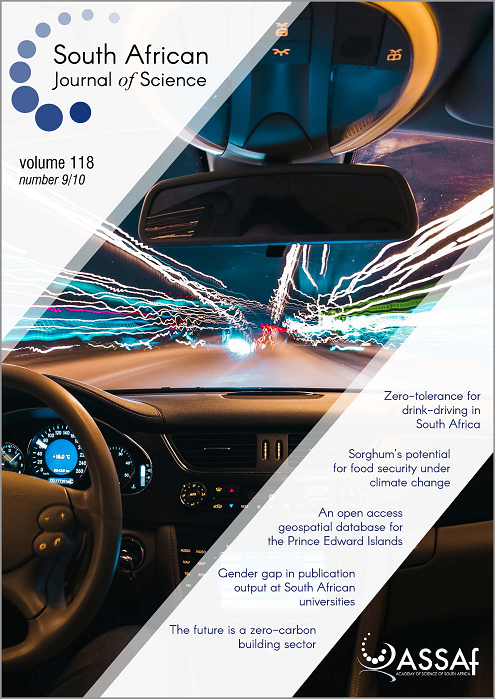Physicochemical properties of porous activated carbon prepared from palm kernel shell through a low-cost activation protocol
DOI:
https://doi.org/10.17159/sajs.2022/13497Keywords:
activated carbon, palm kernel shell, H3PO4 ratio, biomass, pyrolysis, ecofriendlyAbstract
Biomass-promoting routes for the synthesis of activated carbon (AC) have recently received considerable attention due to the advantages of this method: it is simple, cost-effective, and ecofriendly. This method is also an alternative way to avoid the unsafe practice of waste incineration. We describe the preparation of activated carbon from palm kernel shell (PKS) – an abundant biomass that is available in Africa and Asia. We investigated the effect of process variables such as impregnation ratio (ratio of H3PO4 to PKS) and carbonisation temperature (500–700 °C) on yield, microstructure, morphology, pore structure, and adsorption properties to optimise these parameters. Nitrogen adsorption isotherm analysis indicated that the AC was predominantly microporous in nature. Under optimal conditions, an AC with the highest surface area of 1560 m2/g was obtained. The aqueous adsorption test showed that the AC had significant removal capacity for methylene blue and iodine. The higher iodine value is consistent with the structural properties of the adsorbent, while the lower methylene blue value is consistent with the limited mesopore width. Considering the chemical and surface properties and adsorption properties of the AC produced, PKS has been shown to be an excellent precursor material for AC, thus solving the disposal problems associated with this biomass.
Significance:
- AC significantly promotes adsorption and offers a low-cost and cleaner production method.
- PKS could serve as a dependable precursor for the synthesis of porous AC.
- This study provides useful information on how H3PO4-impregnated PKS influences the porosity of the resulting AC.
- Differences in porosity, yield, and morphology and Brunauer–Emmet–Teller surface area are achievable using AC from PKS.
Published
Issue
Section
License

All articles are published under a Creative Commons Attribution 4.0 International Licence
Copyright is retained by the authors. Readers are welcome to reproduce, share and adapt the content without permission provided the source is attributed.
Disclaimer: The publisher and editors accept no responsibility for statements made by the authors
How to Cite
- Abstract 511
- PDF 770
- EPUB 179
- XML 191












.png)